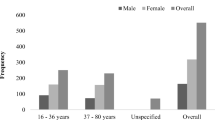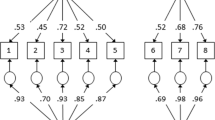Abstract
Several investigations have demonstrated thatneuroticism and ruminative response style are associatedwith increased risk for depression. The current studyexamined the effects of neuroticism and ruminative response style on changes in depressivesymptoms over an 8- to 10-week interval. Analysesindicated that the effects of neuroticism and ruminativeresponse style were moderated by initial level ofdepressive symptomatology. Specifically, neuroticism andruminative response style predicted changes indepressive symptoms more strongly in individuals whowere initially higher in levels of depression than they did in those with lower initial levels ofdepressive symptoms. These data were consistent with apath model in which ruminative response style mediatedthe effect of neuroticism on depression.
Similar content being viewed by others
REFERENCES
American Psychiatric Association. (1994). Diagnostic and statistical manual of mental disorders(4th ed.). Washington, DC: Author.
Barnett, P. A., & Gotlib, I. H. (1988). Psychological functioning and depression: Distinguishing among antecedents, concomitants, and consequences. Psychological Bulletin, 104, 97–126.
Beck, A. T. (1976). Depression: Clinical, experimental, and theoretical aspects. New York: International Universities Press.
Beck, A. T. (1987). Cognitive models of depression. Journal of Cognitive Psychotherapy: An International Quarterly, 1, 5–37.
Belsher, G., & Costello, C. G. (1988). Relapse after recovery from unipolar depression: A critical review. Psychological Bulletin, 104, 84–96.
Boyce , P., Parker, G., Barnett, B., Cooney, M., & Smith, F. (1991). Personality as a vulnerability factor to depression. British Journal of Psychiatry, 159, 106–114.
Butler, L. D., & Nolen-Hoeksema, S. (1994). Gender difference s in responses to depressed mood in a college sample. Sex Roles, 30, 331–346.
Clark, L. A., Watson, D., & Mineka, S. (1994). Temperament, personality , and the mood and anxiety disorders. Journal of Abnormal Psychology, 103, 103–116.
Depue, R. A., & Monroe, S. M. (1986). Conceptualization and measurement of human disorder in life stress research: The problem of chronic disturbance. Psychological Bulletin, 99, 36–51.
Derryberry, D., & Reed, M. A. (1994). Temperament and attention: Orienting toward and away from positive and negative signals. Journal of Personality and Social Psychology, 66, 1128–1139.
Duggan, C. F., Lee , A. S., & Murray, R. M. (1990). Does personality predict long-term outcome in depression? British Journal of Psychiatry, 157, 19–24.
Eysenck, H. J., & Eysenck, S. B. (1964). Manual of the Eysenck Personality Inventory. London, England: Hodder & Stoughton.
Glass, G. V., & Hopkins, K. D. (1984). Statistical methods in education and psychology. Englewood Cliffs, NJ: Prentice-Hall.
Gotlib, I. H., & Hammen, C. L. (1992). Psychological aspects of depression: Toward a cognitive-interpersonal integration. Chichester, England: John Wiley & Sons.
Gotlib, I. H., & MacLeod, C. (1997). Information processing in anxiety and depression: A cognitive developmental perspective. In J. Burack & J. Enns (Eds.) , Attention , development, and psychopathology(pp. 350–378). New York: Guilford Press.
Martin, M. (1985). Neuroticism as predisposition toward depression: A cognitive mechanism. Personality and Individual Differences, 6, 353–365.
Morrow, J., & Nolen-Hoeksema, S. (1990). Effects of responses to depression on the remediation of depressive affect. Journal of Personality and Social Psychology, 58, 519–527.
Nolen-Hoeksema, S. (1987). Sex differences in unipolar depression: Evidence and theory. Psychological Bulletin, 101, 259–282.
Nolen-Hoeksema, S. (1990). Sex differences in depression. Stanford, CA: Stanford University Press.
Nolen-Hoeksema, S. (1991). Responses to depression and their effects on the duration of depressive episodes. Journal of Abnormal Psychology, 100, 569–582.
Nolen-Hoeksema, S. (1993). Sex differences in control of depression. In D. M. Wegner & J. W. Pennebaker (Eds.), Handbook of mental control(pp. 306–324). Englewood Cliffs, NJ: Prentice Hall.
Nolen-Hoeksema, S., & Morrow, J. (1991). A prospective study of depression and posttraumatic stress symptoms after a natural disaster: The 1989 Loma Prieta Earthquake. Journal of Personality and Social Psychology, 61, 115–121.
Nolen-Hoeksema, S., & Morrow, J. (1993). Effects of rumination and distraction on naturally occurring depressed mood. Cognition and Emotion, 7, 561–570.
Nolen-Hoeksema. S., Morrow, J., & Frederickson, B. L. (1993). Response styles and the duration of episodes of depressed mood. Journal of Abnormal Psychology, 102, 20–28.
Roberts, J. E., Gilboa, E., & Gotlib, I. H. (1998). Ruminative response style and vulnerability to episodes of dysphoria: Gender, neuroticism, and episode duration. Cognitive Therapy and Research, 22, 401–423.
Roberts, J. E., & Gotlib, I. H. (1997). Lifetime episodes of dysphoria: Gender, early childhood loss and personality. British Journal of Clinical Psychology, 36,195–208.
Roberts, J. E., & Monroe, S. M. (1992). Vulnerable self-esteem and depressive symptoms: Prospective findings comparing three alternative conceptualizations. Journal of Personality and Social Psychology, 62, 804–812.
Saklofske, D. H., Kelly, I. W., & Janzen, B. L. (1995). Neuroticism, depression, and depression proneness. Personality and Individual Differences, 18, 27–31.
Weissman, M. M., & Klerman, G. L. (1977). Sex differences and the epidemiology of depression. Archives of General Psychiatry, 34, 98–111.
Zimmerman, M., & Coryell, W. (1987). The inventory to diagnose depression, lifetime version. Acta Psychiatrica Scandinavia, 75, 495–499.
Zimmerman, M., Coryell, W., Corenthal, C., & Wilson, S. (1986). A self-report scale to diagnose major depressive disorder. Archives of General Psychiatry, 43, 1076–1081.
Rights and permissions
About this article
Cite this article
Nolan, S.A., Roberts, J.E. & Gotlib, I.H. Neuroticism and Ruminative Response Style as Predictors of Change in Depressive Symptomatology. Cognitive Therapy and Research 22, 445–455 (1998). https://doi.org/10.1023/A:1018769531641
Issue Date:
DOI: https://doi.org/10.1023/A:1018769531641




